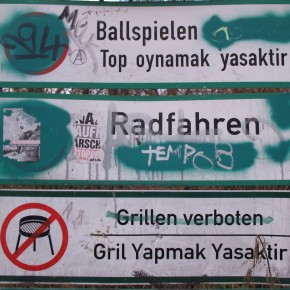The English debut of Roberto Bolaño’s The Third Reich is a major literary event, despite the book’s restrained ambitions. Because the author’s posthumous fame shows no sign of abating, this disconcerting tale is bound to reach a much larger audience than the specialized nature of its subject matter would otherwise suggest. And deservedly so, for it provides ample evidence of Bolaño’s brilliance.
Although The Third Reich has been billed, somewhat erroneously, as Bolaño’s first novel, it hardly seems like one. His narrator is Udo Berger, a German on a seaside holiday in Spain. While he joins his girlfriend Ingeborg at the beach and goes clubbing with her and a German couple, Charly and Hanna, they have met during their stay, he often retires to the hotel room to ponder strategy for the complex board game he plays for both fun and modest profit.
It’s that Avalon Hill game from the 1970s, technically called Rise and Decline of the Third Reich (but usually abbreviated as Third Reich), that gives the book its title. Strangely, it doesn’t occur to Berger that his investment in the world it conjures may seem odd to others, particularly since he is a German who delights in taking the role of Germany. When he learns, late in the story, that some locals refer to him as a Nazi, he is dumbfounded, noting that, if anything, he is an “anti-Nazi.” Nevertheless, he takes delight in reversing the course of history, finding clever ways to neutralize the Allies’ advantages. Indeed, he plays the game so skillfully that he is the current German champion.
Bolaño expertly mobilizes the irony of Berger’s situation throughout the novel, eventually pitting him against an improbable opponent, the burn-scarred paddle boat operator known as “El Quemado.” Alternately fascinated and repelled by this soft-spoken outsider, whom most people regard as a monster, Berger decides to teach him the game. But the hubris he demonstrates in taking on this beginner proves his undoing, both in Third Reich and the “real world” to which his connection grows increasingly tenuous.
The novel is presented in the form of a diary that Berger has decided to keep in order to improve his prose. As a champion, he has been invited to submit articles to the specialized periodicals that cater to the strategic board game community. But criticism of his writing has left him feeling wounded. With the encouragement of his friend Conrad, he decides that rigorously documenting his experiences abroad will be the best way to remedy that failing.
Many accomplished novelists would struggle to sustain this conceit. But Bolaño pulls it off effortlessly. We can tell that Berger is smart and keenly aware of his surroundings, but suffers from a dearth of worldly experience. His youthful narcissism prevents him from acknowledging the subjectivity of others, whom he tends to regard as pieces to be manipulated for personal ends. Even when he is reminded that his preferences are not shared by many, he continues to prioritize his inner life:
At noon I joined Ingeborg on the beach. I was, I must admit, in a state of exaltation after having spent a productive morning with the game board, and I did something I don’t usually do: I gave a detailed account of my opening strategy, until Ingeborg interrupted me saying that people were listening. I contended that this was only to be expected, since thousands of people were crowded on the beach shoulder to shoulder.
Despite coming to realize that Ingeborg is ashamed by his blithe discussion of the German war effort, Berger declines to join her on a maritime outing:
I said I couldn’t come, claiming work as my excuse. When I told her that I planned to sketch out the first two turns that afternoon, she gave me the same look that I had already witnessed on the beach. With true horror I realize that something is beginning to come between us.
What’s coming between them, of course, is The Third Reich. That Berger himself overlooks this obvious point demonstrates that he is a classic example of what literary critic Wayne C. Booth calls the “unreliable narrator.”
The inconsistencies of Berger’s prose, the way it backtracks or bogs down in superfluous detail, testify to Bolaño’s facility for managing this complex literary construct. Even as we see the world from Berger’s perspective, we are continually aware of what he does not see. More impressively still, we also perceive that this blindspot is inextricably bound up with the strategic vision that makes him so successful playing games like Third Reich.
But Bolaño’s cleverness does not end there. Berger’s character stands in for all those who would rather spend their holidays engaged in private pursuits, from knitting to reading. Indeed, his immersion in Third Reich is not much different from the far more common experience of those who travel to beach resorts only to spend their time with their head in a book. In other words, the game serves as an apt figure for fiction itself.
Given the ascendancy of game-playing in contemporary culture, the timing of The Third Reich‘s publication couldn’t be better. From the lighthearted social media games of companies like Zynga through highly detailed PlayStation 3 and Xbox games like the Call of Duty series to deeply involved online role-playing games in the World of Warcraft tradition, the free time that used to be spent reading books or watching television or movies is increasingly devoted to competitive interactions for which the outcome is not fixed in advance.
Berger’s impulse to rewrite the history of the Third Reich may seem perverse, especially considering his German heritage, but it is perfectly in step with a world in which people take the right to do-overs for granted. Mind you, long before computers popularized the notion of the “undo” function, a large portion of our culture was devoted to repetitive consumption. There’s a reason, after all, that we describe what happens in a novel or film in the present tense: so long as a text survives, it can be experienced anew. The difference today is that game-playing has highlighted the potential for all fiction to work like “choose-your-own-adventure” books.
Writing The Third Reich in the late 1980s, Bolaño clearly anticipated this shift of emphasis. A devoted player of board games, he was surely aware of what the computerization of role-playing portended, even if he was unable or unwilling to go down that path himself. It’s somehow fitting, then, that his “first” novel turned into his last one, a time capsule that can illuminate the future of fiction by allowing us to rewrite its past.
In the process, The Third Reich also gives us the opportunity to rethink Bolaño’s legacy. Because the author’s best known works are the exuberant, peripatetic Künstlerroman The Savage Detectives, which brought him international fame, and the sprawling posthumous opus 2666, hailed by many as a masterpiece, he has been portrayed, particularly in the English-speaking world, as a worthy successor to Latin American literary titans like Gabriel García Márquez and Carlos Fuentes. But this characterization not only groups Bolaño together with writers he went to war against, but also ignores the fact that he spent most of his career writing miniatures, small books that are suspicious of anything with epic scope, including games like Third Reich.
While the self-characterization of artists is often suspect, whether because they are actively seeking to deceive others or merely deceiving themselves, it is clear that Bolaño was ambivalent about his attempt to produce major works in the last decade of his life. He repeatedly declared himself to be a poet first and foremost, claiming to have started writing novels in order to earn money for his children, since poetry simply doesn’t pay.
Although this insight need not diminish the pleasures of The Savage Detectives or 2666, which compare quite favorably to other “big” books of our era, it does turn The Third Reich‘s belatedness into a blessing. Udo Berger’s sweeping attempt to rewrite history in his match with El Quemado may fail miserably, but his modest attempt to record his experiences is a success. By staying focused on the details of his day-to-day existence, he provides the template for a literature that trusts readers to fill in the blanks. And in the process he provides the impetus to conjure a different image of Roberto Bolaño, one who never gave up believing that the lyric could and should encompass the epic.



Whoever thought a book about a board game could be so intriguing?